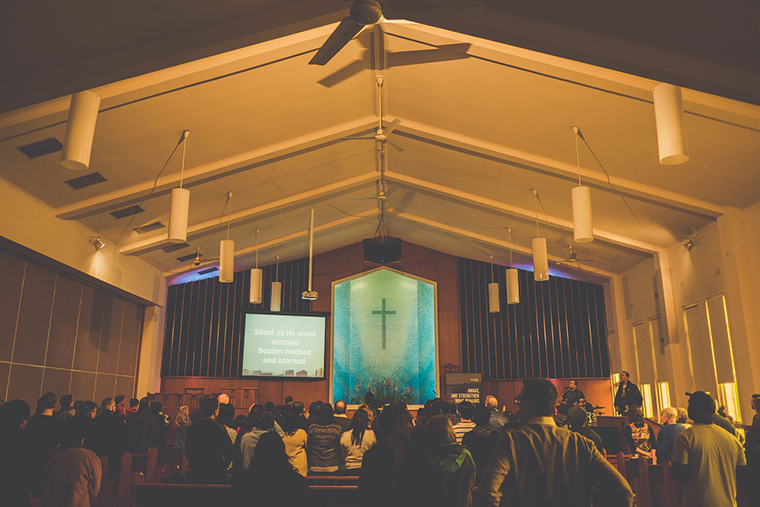A Story of Failure: My First Year as a Worship Director

There is a story from my first year as a worship pastor that I tell every student that enters my program.
I tell it partly as an illustration of my own capacity for failure (so it resonates in their memory when they discover their own capacity in that direction). And partly because I want them to catch something critical that I missed.
The first paid church job I had was as the “music director” of a church of about 250. The year after graduating from university, I received a phone call from a mentor of mine asking if I would be interested in a worship leadership role in a local congregation, and I sat down with the lead pastor no more than two days later. He had just moved from an associate role into the lead role, and at that point in time he was the only pastor on staff: preaching every Sunday, leading worship every Sunday, and managing all adult education classes. After we talked for a while, he said “Great! Your trial Sunday will be this coming Sunday!” (It was Thursday.) I think he was relieved to be able to move one thing off of his plate.
What I didn’t know was that the church had just undergone a shift from two services back to one. The early service had been piano only, all hymns. The second service was a full band, and mostly contemporary-style songs. I was asked to lead full band, contemporary… you can see where this is going.
Despite setting off the alarm at Sunday morning practice, and not having the code to hush it before the firetrucks arrived, that first Sunday went well enough that they hired me: $10 and hour, 10 hours a week to lead every single Sunday service, and to assist with planning/implementation of Christmas programs, a big Easter service, etc.
Being young and somewhat naïve, after the first 2-3 months of leadership, I wanted to get a sense of what the congregation was thinking. I put an anonymous survey in the box of every congregant… you can see where this is going.
For the most part, the feedback was positive, encouraging, and overall kind. But one survey that came back made my heart drop. It read (and believe me, this is an exact quote): “In the time since you were hired, I have worshipped one time: when we sang ‘My Jesus I Love Thee,’ acapella, sitting down.”
—

Clearly I had failed. I ran to the lead pastor’s office with the incriminating document, thrust it into his hands, and stood there—shaking—while he read it. I offered to resign.
I failed.
But not in the way I thought I had.
You see… the “anonymous” survey that sent me into a tailspin was signed—in big, block letters—at the top.
I spent the rest of my time at that church actively avoiding the man who had eviscerated me with those few sentences.
Two years later, working three jobs at a time wore me down and I did finally resign from my position at the church—I remained a member and continued to be involved there for some time. When it came time for the next AGM, I argued hard for an increase in salary and time for the position I had previously filled—and both time and salary were doubled. They hired someone new—someone else my age, but perhaps a little wiser.
She took the time to sit down with the author of my devastating survey and hear him. To understand what his concerns were, and hear why he felt so strongly about them. She did not change her “style” of leadership because of that conversation—she continued to lead a full band, and mostly “contemporary” songs. It didn’t matter.
He became one of her biggest champions.
When the next AGM rolled around, I didn’t need to argue for additional increases for her as I had intended. He argued for her.
I hadn’t failed in the style of my leadership, or even in my rampant insecurity that allowed one negative comment to torpedo every positive comment I received.
No, I had missed a pastoral moment. I failed relationally.
The signing of that “anonymous” survey was an invitation to conversation. And I missed it. In my insecurity, in my deep concern to meet everybody’s needs, I missed the opportunity to lean in and have a difficult conversation. I didn’t give this man an opportunity to be heard. I didn’t give myself the opportunity to hear him and respond. I didn’t give him the opportunity to respond to me in return. I missed the moment.
It’s something I want my students to remember.

When I tell this story in Pastoral Worship Leadership, it forms part of the introduction of a number of classes on what it means to be a pastor in the context of worship leadership. We frame that discussion as the pastoral task of “listening in two directions.”
We need to listen to the Spirit—and the Spirit’s voice retains primacy—but we also need to have one ear swiveled toward our congregation. Worship Pastors don’t get to check out after they lead Sunday morning, and just pop back in the next week.
We lead better, make better choices, attend to spiritual formation in our congregations by knowing them, by walking alongside them.
Don’t worry, I also teach my students about handling criticism: resisting defensiveness, yes, but also not taking everything onto their shoulders. We discuss the inclusion of wise outside voices that we can invite to speak into us and help us discern valid criticism from invalid criticism.
But worship leaders, of all people, need to recognize that “complaints” about worship sometimes (often) are about a surface issue that masks something deeper—usually there is a deeper.
Complaints can be an invitation into a pastoral moment.
So I hope my students remember my failure when they encounter a “pastoral moment” of their own. I hope they take a deep breath and push down all the defensive actions and words that they will want to immediately unleash. I hope they resist the tendency to decide their job (and life) is over and they must slink away, disgraced, into a corner. Instead, I hope they see that a difficult conversation can lead to relationship. I hope they catch the pastoral moment.

Stacey Gleddiesmith is the Director of Worship Arts at Columbia Bible College. She received an MDiv with a concentration in Christianity and the Arts from Regent College, and has over twenty years of experience leading worship in various church and mission contexts. She is particularly interested in the theology of worship and how that translates into our church practices. When she doesn’t have her head in a book, she can be found in the pottery studio, or hiking with her husband Andrew and their


